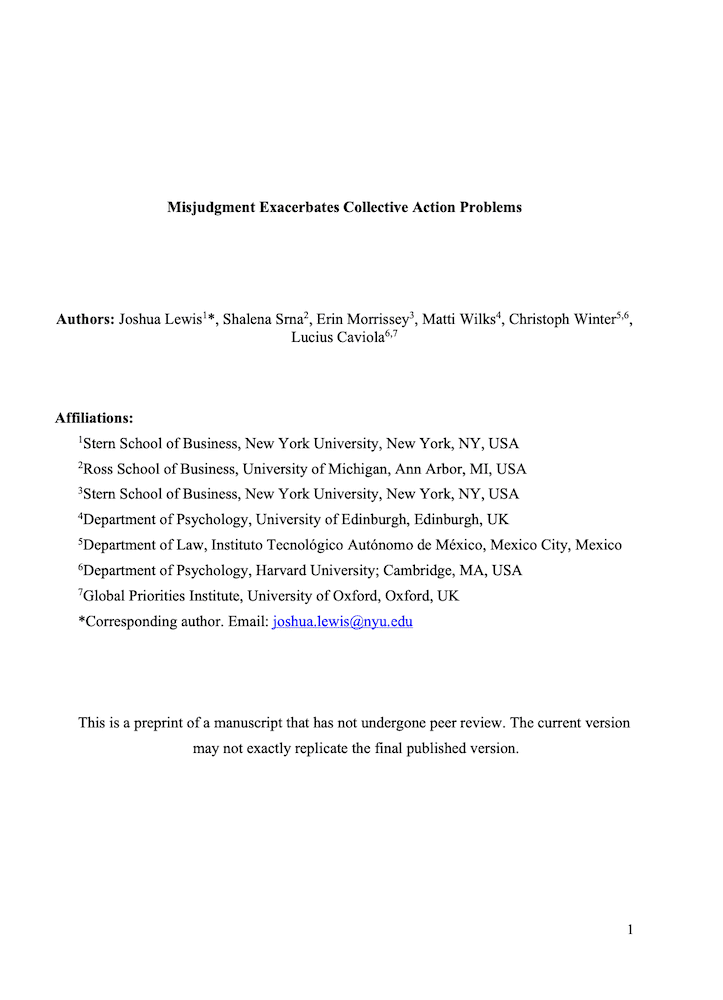Misjudgment Exacerbates Collective Action Problems
Joshua Lewis (New York University), Shalena Srna (University of Michigan), Erin Morrissey (New York University), Matti Wilks (University of Edinburgh), Christoph Winter (Instituto Tecnológico Autónomo de México and Harvard Univeristy) and Lucius Caviola (Global Priorities Institute, University of Oxford)
GPI Working Paper No. 2-2024
In collective action problems, suboptimal collective outcomes arise from each individual optimizing their own wellbeing. Past work assumes individuals do this because they care more about themselves than others. Yet, other factors could also contribute. We examine the role of empirical beliefs. Our results suggest people underestimate individual impact on collective problems. When collective action seems worthwhile, individual action often does not, even if the expected ratio of costs to benefits is the same. It is as if people believe “one person can’t make a difference.” We term this the collective action bias. It results from a fundamental feature of cognition: people find it hard to appreciate the impact of action that is on a much smaller scale than the problem it affects. We document this bias across nine experiments. It affects elected policymakers’ policy judgments. It affects lawyers’ and judges’ interpretation of a climate policy lawsuit. It occurs in both individualist and collectivist sample populations and in both adults and children. Finally, it influences real decisions about how others should use their money. These findings highlight the critical challenge of collective action problems. Without government intervention, not only will many individuals exacerbate collective problems due to self-interest, but even the most altruistic individuals may contribute due to misjudgment.
Other working papers
The unexpected value of the future – Hayden Wilkinson (Global Priorities Institute, University of Oxford)
Various philosophers accept moral views that are impartial, additive, and risk-neutral with respect to betterness. But, if that risk neutrality is spelt out according to expected value theory alone, such views face a dire reductio ad absurdum. If the expected sum of value in humanity’s future is undefined—if, e.g., the probability distribution over possible values of the future resembles the Pasadena game, or a Cauchy distribution—then those views say that no real-world option is ever better than any other. And, as I argue…
Longtermist political philosophy: An agenda for future research – Jacob Barrett (Global Priorities Institute, University of Oxford) and Andreas T. Schmidt (University of Groningen)
We set out longtermist political philosophy as a research field. First, we argue that the standard case for longtermism is more robust when applied to institutions than to individual action. This motivates “institutional longtermism”: when building or shaping institutions, positively affecting the value of the long-term future is a key moral priority. Second, we briefly distinguish approaches to pursuing longtermist institutional reform along two dimensions: such approaches may be more targeted or more broad, and more urgent or more patient.
What power-seeking theorems do not show – David Thorstad (Vanderbilt University)
Recent years have seen increasing concern that artificial intelligence may soon pose an existential risk to humanity. One leading ground for concern is that artificial agents may be power-seeking, aiming to acquire power and in the process disempowering humanity. A range of power-seeking theorems seek to give formal articulation to the idea that artificial agents are likely to be power-seeking. I argue that leading theorems face five challenges, then draw lessons from this result.

